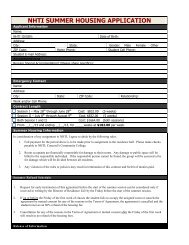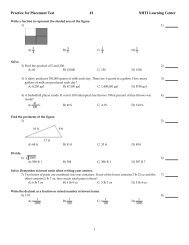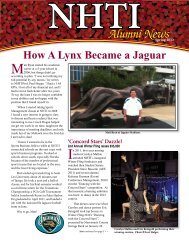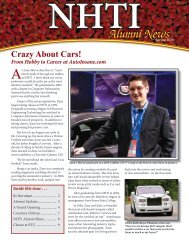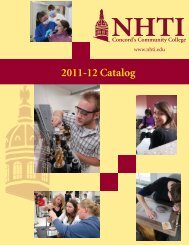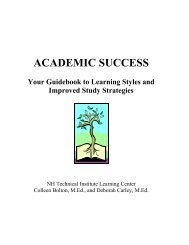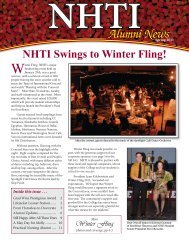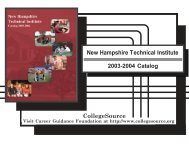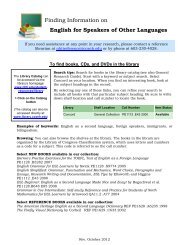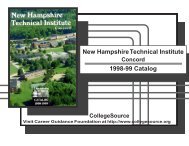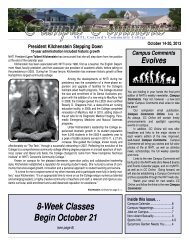Course Descriptions 11-12 - NHTI - Concord's Community College
Course Descriptions 11-12 - NHTI - Concord's Community College
Course Descriptions 11-12 - NHTI - Concord's Community College
- No tags were found...
Create successful ePaper yourself
Turn your PDF publications into a flip-book with our unique Google optimized e-Paper software.
travel experience to Costa Rica, where the class will visitseveral major ecological systems and conservation areas. Thelaboratory portion of the course will consist of the nine-dayexcursion to Costa Rica through the <strong>NHTI</strong>-sponsored CultureQuest trip. The travel portion of this course is a major part ofthe laboratory component and is required. During the time inCosta Rica, students will apply what they have learned tounderstand the different ecosystems visited, identify tropicalplants and animals, and appreciate the threats to and effortsto conserve the unique biodiversity of Costa Rica.(Prerequisite: High school biology with lab with a grade of“C” or higher and high school chemistry with lab with a gradeof “C” or higher.) [Students should note that the cost of thetrip to Costa Rica is not included in the tuition for thiscourse. Students are responsible for all costs of this trip.]BI 195 Anatomy and Physiology I 3-2-4An introduction to the structure and function of the humanbody. Includes elementary cytophysiology, histology, andanatomy and physiology of the integumentary system,skeletal system, muscular system, nervous system, andspecial senses. Laboratory work parallels lecture topics, andincludes microscopy, study of human anatomical models,dissection of preserved animals, and physiologicalexperimentation. (Prerequisite: high school biology with laband high school chemistry with lab, each with a grade of“C”or higher, or permission of the Department Head ofChemistry and Biological Sciences)BI 196 Anatomy and Physiology II 3-2-4A continuation of BI 195. Includes anatomy and physiology ofthe endocrine system, circulatory system, immune system,respiratory system, digestive system, excretory system, andreproductive system. Other topics covered include nutritionand metabolism, acid/base balance, fluid and electrolytebalance, and genetics. Laboratory work parallels lecturetopics, and include microscopy, study of human anatomicalmodels, dissection of preserved animals, and physiologicalexperimentation. (Prerequisite: BI 195 with a grade of “C” orhigher or permission of department head of Chemistry andBiological Sciences)BI 202 Microbiology 3-3-4Lectures focus on three major areas: 1) basic concepts ofmicrobiology, including morphology and physiology ofprokaryotes, eukaryotes, and viruses; 2) host resistance todisease and immunology; and 3) epidemiology of selecteddiseases caused by bacteria, viruses, fungi, protozoa, andparasitic worms. Labs also focus on three major areas: 1)basic skills such as staining, microscopy, and isolationtechniques; 2) bacterial physiology as is pertinent toidentification of bacterial species; and 3) control ofmicroorganisms via chemotherapeutic agents, physicalmeans and chemical disinfectants. (Prerequisite: BI 196 witha grade of “C” or higher)BI 2<strong>11</strong> Genetics 3-2-4A lab course intended to enhance a student's knowledge ofbasic genetics and to provide the foundation necessary forfurther studies in molecular biology, cell biology, evolution,systematics, and behavior. Topics covered will includeMendelian genetics, molecular genetics, immunogenics,genetics of cancer and population genetics. (Prerequisites: BI<strong>11</strong>1, or BI 195, or BI 202, and MT <strong>12</strong>4 or equivalent; orpermission of department head of Chemistry & BiologicalSciences)BI 2<strong>12</strong> Ecology 3-2-4Investigations into the biological and physical factorsaffecting the distribution, abundance, and adaptations oforganisms. Interrelationships at the population, community,and ecosystem levels will be studied. (Prerequisites: BI <strong>11</strong>1,BI <strong>11</strong>2 and MT <strong>12</strong>4; MT 251 recommended; or permission ofdepartment head of Chemistry and Biological Sciences)BI 215 Freshwater Ecology 3-2-4This course enhances students’ understanding of ecology,and introduces them to the biological, chemical, and physicalproperties of lakes, streams, and wetlands as they relate tothe structure and function of freshwater ecosystems.Students will gain an understanding of freshwaterenvironmental concerns and experience in water qualityassessment. The course will also cover topics insustainability, management, and rehabilitation of naturalaquatic environments in relation to human impact.(Prerequisite: BI <strong>11</strong>1 or BI <strong>11</strong>2 or BI <strong>11</strong>5 with a grade of “C”or higher)BI 222 Pathophysiology 3-0-3A course that provides the allied health student with anunderstanding of disease processes by building on thestudent's knowledge of normal anatomy and physiology.Common disorders of major body systems are discussedrelative to the mechanisms by which they develop and theireffects on homeostasis. (Prerequisite: BI 196 or permission ofdepartment head of Chemistry and Biological Sciences)BI 229 Nutrition in Exercise and Sports 3-0-3This course introduces the student to nutrition as it relates tothe improvement or optimization of physical performance.Dietary interventions for strength and endurance exercisetraining and sporting event participation will be thoroughlyinvestigated. Special emphasis will be placed on weightmanagement; the reduction, maintenance and gain of bodymass. (Prerequisites: BI 195 & 196, or BI 159 or equivalent)BI 259 Normal and Therapeutic Nutrition 4-0-4An introductory course in normal and therapeutic nutritiondesigned for students in allied health programs. Focuses onthe application of basic principles of nutrition to healthpromotion and disease prevention, as well as the role ofnutritional intervention as a therapeutic tool in specificpathologies. Includes discussion of contemporary issues innutrition. (Prerequisites: BI 159 or permission of departmenthead of Chemistry and Biological Sciences.)BI 279 Life Cycle Nutrition 3-0-3Focuses on nutritional needs of the growing, developinghuman from conception to old age, with particular emphasison the nutritional needs of infants, children, adolescents,adults, women and aging adults. (Prerequisite: BI 259 orpermission of department head of Chemistry and BiologicalSciences.)8/17/20<strong>11</strong> <strong>NHTI</strong>, Concord’s <strong>Community</strong> <strong>College</strong> <strong>Course</strong> <strong>Descriptions</strong> 20<strong>11</strong>-20<strong>12</strong> 8



